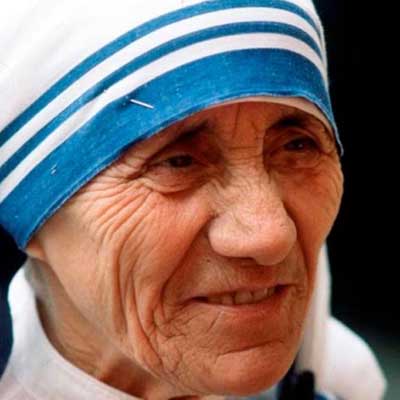
Mother Teresa.
September 6, 2016
On September 5, 2016, the Albanian Agnes Gonxha Bojaxhiu, known worldwide as Mother Teresa, joined about 10,000 other saints in the Roman Catholic heaven.
In full disclosure, I am not a Roman Catholic and I admit that I find the whole concept of sainthood absurd — the idea that a group of old men in the Vatican deciding whether a person is worthy of being a Roman Catholic saint.
That said, Pope Francis has consistently pointed to the scandal of poverty in a world of plenty as a moral challenge for the church and the whole human community. The canonization of Mother Teresa, who had a reputation of ministering to the poorest of the poor, is in keeping with Pope Francis’s exhortation to care for the poor.
However, Mother Teresa is not without her critics.
Mother Teresa devoutly believed that suffering – even when caused by poverty, medical problems, or starvation – was a gift from God. As a result, while her clinics received millions of dollars in donations, their conditions drew criticism from people disturbed by the shortage of medical care, systematic diagnosis, and necessary nutrition, as well as the scarcity of adequate analgesics to those in need. It was estimated that she raised over $100 million for her charity, yet only 5-7 percent of this money was used in helping the poor. Why didn’t she build a hospital in Kolkata with some of the money she raised?
Interestingly enough, the late Christopher Hitchens, author of “The Missionary Position: Mother Teresa in Theory and Practice” was selected by the Vatican in 2001 to testify at a hearing on the beatification of Mother Teresa. The then Pope had abolished the office of the “Devil’s Advocate,” which had the job of confirming and canonizing an enormous number of new “saints.” The church felt obliged to seek testimony from critics, and Hitchens was selected to represent the devil, pro bono.
According to Hitchens and many others, “Mother Teresa is less interested in helping the poor than in using them as an indefatigable source of wretchedness on which to fuel the expansion of her fundamentalist Roman Catholic beliefs.”
A miracle is required for beatification. The first “miracle” attributed to Mother Teresa was the healing of a woman, Monica Besra, who had been suffering from intense abdominal pain. On September 5, 1998, as the Missionaries of Charity order was witnessing the first death anniversary of Mother Teresa with prayers in the chapel, Monica Besra felt a beam of light emanating from the photograph of Mother Teresa. In the evening, two sisters of the order tied a medallion with Mother Teresa’s picture around Besra’s waist and prayed over her. That night she slept peacefully after months of painful sleeplessness. When she woke up in the morning, her tumour was gone. Her doctors thought otherwise: the ovarian cyst and the tuberculosis from which she suffered were healed by the drugs they had given her. In spite of this plausible, reasonable explanation for the so-called medical “miracle” in question, the Vatican declared this a miracle.
A second miracle is required for canonization. In December 2008, a Brazilian man, Marcilio Haddad Andrino recovered from multiple abscesses in his brain. When he was diagnosed with the abscesses, he and his wife placed a relic of Mother Teresa near his head and prayed to her regularly. When in December 2008 he was rushed to the hospital on account of a severe headache, Andrino claimed to have experienced a miracle which led to his eventual cure. He reported to have felt a sense of peace and the headache suddenly disappeared. When the doctors examined him the following day his abscesses were seen as receding and he was declared to be cured.
To me, an outsider, this miracle business seems quite bizarre.
Hitchens had no doubt that Mother Teresa, deservedly or not, would ultimately be proclaimed a saint. Hitchens was prescient.
The Vatican has not refuted the criticism directed at Mother Teresa; they have just disregarded it. Why has the Vatican decided to canonize Mother Teresa? In my opinion, she is being rewarded posthumously for bringing fame and countless donations to her church.


 The Hunger Site
The Hunger Site
No Comments
Comments for Despite Criticism, Mother Teresa Canonized a Saint are now closed.